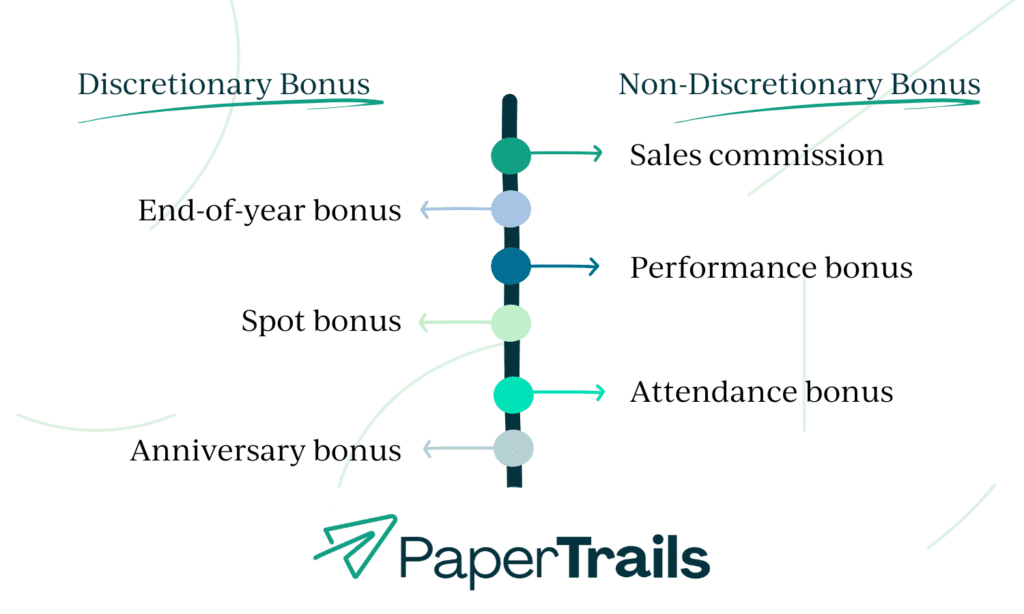In the minds of most employees, bonuses play a pivotal role in employee compensation and motivation. According to a recent survey, over 80% of employees report that receiving a bonus enhances their job satisfaction and overall morale. For small business owners and HR professionals, understanding different bonus structures is crucial for creating a motivated workforce while ensuring compliance.
This article breaks down bonuses, and more specifically non-discretionary bonuses. Each type of bonus is a key component of employee rewards policies. After reading this article, you will have gained insights into what non-discretionary bonuses are, how they differ from discretionary bonuses, their impact on overtime pay, and the tax implications associated with them. Paper Trails aims to provide business owners and HR enthusiasts with the proper understanding of business practices and policies that can impact their own businesses. Let’s get started.
What is a bonus?
Before we explore non-discretionary bonuses, let’s define what a bonus is in terms of employee compensation. A bonus is an additional payment given to employees above their regular hourly or salary rate. It’s a form of financial reward intended to recognize and incentivize employees. Bonuses can vary greatly in terms of their conditions, frequency, and amount. To read more about how to navigate bonus payrolls, check out this article.
What is a non-discretionary bonus?
A non-discretionary bonus is a type of bonus that employees expect to receive under specific conditions as set by their employer. Unlike discretionary bonuses, which are given at the employer’s will without prior promise or obligation, non-discretionary bonuses are predetermined and contractually agreed upon. Employees generally know at the beginning of employment that they can receive certain bonuses if expectations are met. They are often tied to performance, milestones, or specific achievements. Further, the employer is obligated to pay them once the set conditions are met.
What is the difference between discretionary and non-discretionary?
The main difference between discretionary and non-discretionary bonuses lies in their predictability and the obligation to pay. Discretionary bonuses are awarded at the employer’s discretion without any prior commitment. They are typically given as a surprise or as a token of appreciation and are not guaranteed. On the other hand, non-discretionary bonuses are expected and are part of the employee’s anticipated compensation. They are typically outlined in employment contracts or company policies and are awarded based on the achievement of predefined goals or standards.
Examples of each type of bonuses can include:
Discretionary:
- End-of-year bonus: An employer decides to give employees a surprise bonus at the end of the year based on the company’s overall performance. The amount varies each year and is not announced or guaranteed in advance.
- Spot bonuses for exceptional work: An employee goes above and beyond on a critical project, delivering exceptional results. The employer rewards them with a one-time bonus as a token of appreciation. This bonus is given spontaneously and is not tied to any pre-established criteria or performance metrics.
- Anniversary recognition bonus: On an employee’s work anniversary, the employer decides to give a bonus as a gesture of appreciation for their years of service. The decision to give this bonus and its amount are at the complete discretion of the employer and are not promised or expected each year.
Non-discretionary:
- Sales commission: Sales employees have a structured commission plan where they receive a specific percentage of the sales they make. This bonus is non-discretionary as it is based on predefined and agreed-upon sales targets.
- Performance-based year-end bonus: An employer sets clear performance goals at the beginning of the year. Employees who meet or exceed these goals are promised a specific bonus amount or percentage of their salary. This type of bonus is non-discretionary as it is based on meeting the pre-established criteria.
- Attendance bonus: Employees are promised a bonus for not missing any days of work or for not taking unscheduled leave over a certain period, such as a quarter or a year. This bonus is non-discretionary as it is based on a specific condition that employees are aware of in advance.

How does a non-discretionary bonus impact overtime pay?
For non-exempt employees, the inclusion of non-discretionary bonuses is crucial in the calculation of overtime pay. According to the Fair Labor Standards Act (FLSA), non-discretionary bonuses must be factored into the regular rate of pay, which is used to calculate overtime rates. This means that if an employee earns a non-discretionary bonus, their regular hourly rate of pay increases. When their pay rate increases, the rate of overtime pay they are entitled to also increases. Small business owners and HR professionals must be vigilant in correctly calculating overtime and blended overtime pay, including non-discretionary bonuses, to comply with labor laws and avoid potential disputes or penalties.
How do taxes work for bonuses?
The taxation of bonuses, whether discretionary or non-discretionary, is important for employers to understand. Generally, bonuses are considered supplemental wages and are subject to payroll taxes. This includes federal and state (where applicable) income tax, Social Security, Medicare taxes, FUTA and SUTA. The IRS provides specific guidelines on how to withhold taxes from bonus payments. There are two primary methods for tax withholding on bonuses: the percentage method and the aggregate method. The percentage method involves a flat tax rate, typically 22%, while the aggregate method combines the bonus with the employee’s regular wages and taxes the total as a single payment. More information on these methods can be found here.
Conclusion
For business owners and HR professionals, knowing the ins and outs of non-discretionary bonuses is essential. Non-discretionary bonuses, when used strategically, can significantly enhance employee motivation, performance and retention. However, it’s imperative to understand their implications on payroll, overtime calculations, and taxation. By staying informed and applying best practices in bonus administration, businesses can foster a positive work environment, enhance employee satisfaction, and maintain legal compliance. Contact our team here for assistance with your bonus policies and payrolls.